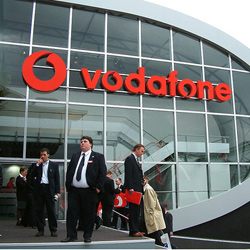| Рубрикатор |  |
 |
| Все новости |  |
World News |  |
 |
Vodafone seeks greater control over handsets, in talks with OHA
| 12 февраля 2008 |
The operator, which is pushing for the adoption of open operating systems such as Linux, is also in talks with Google to join the Open Handset Alliance, which is developing the Android phone.
Vodafone is taking a more aggressive stance towards big-brand handset manufacturers with the launch of its latest own-brand handsets, which are moving up market.
“We are in discussions … if we can agree on a sensible business model, we would consider,” joining the OHA, said Jens Schulte-Bockum, Global Director of Terminals, Vodafone Group, speaking at the Mobile World Congress on Monday.
 Certainly more open operating systems will play an important role in the group’s future own-branded handset strategy, as manufacturers such as Nokia and Sony Ericsson develop their own content strategies in the form of Ovi and music downloads.
Certainly more open operating systems will play an important role in the group’s future own-branded handset strategy, as manufacturers such as Nokia and Sony Ericsson develop their own content strategies in the form of Ovi and music downloads.
Currently Vodafone is focusing sales of its own-branded handsets, which account for approximately 17% of handsets it procures, on emerging markets and pre-paid European customers. That is set to change.
“Longer term [our goal] is to sell into the higher-end space and to do that we need an open operating system on Microsoft, Series 60, or Linux,” said Schulte-Bockum.
However, Vodafone expects it will take another year before it is ready to launch its own-brand high-end phones, based on an open operating system.
“We are very supportive of Linux mobile and want to bring the terminals platform and ODM [original device manufacturers] together. Clearly one year from now we should have the first operating system on fully branded 3G devices. If it will be Series 60, Linux or Microsoft, I can’t say,” said Schulte-Bockum.
In the meantime, Vodafone will collaborate with Research in Motion to create customised BlackBerry devices for the consumer market that will combine Vodafone applications, such as music services and mobile television with BlackBerry applications. The customized BlackBerry devices will be available as of autumn 2008.
Vodafone is quick to stress that own-branded handsets will not dominate sales in developed markets, although it noted that in the last two months, Vodafone-branded handsets were the second-biggest sellers in the Indian market.
They are “still a huge way behind Nokia”, admitted Schulte-Bockum. “It’s very much biased to emerging markets,” he added. In Europe only one in 10 of the devices that Vodafone sells are own-branded.
Still, own-branded phones offer cost savings to Vodafone of between 20% and 30%, compared to traditional branded handsets.
A sizeable percentage of the cost of a handset reflects the big-brand handset manufacturers’ marketing spend. “As an operator I’m not interested in building someone else’s brand, but I pay for it in the transfer price,” said Schulte-Bockum. But it also reflects the investment that companies such as Nokia and Sony Ericsson make in innovation.
“We don’t have to invest as much in research and development and we are not aspiring … to high end innovation,” said Schulte-Bockum.
Instead, by working with companies such as Huawei and HTC Vodafone can keep handset prices low and build up subscriber numbers in emerging markets.
“For the rock bottom we need to be very cheap … at the $20 mark,” which is close to the transfer price that Vodafone pays its white label phone manufacturers for the lowest entry level phones, says Schulte-Bockum.
“The clamshell and slider [phones Vodafone is launching at MWC on Monday] are more complex and as a result will retail at between E39 Euros and E49 [without subsidies] in the European market,” said Schulte-Bockum.
Источник: Total Telecom
















Оставить свой комментарий:
Комментарии по материалу
Данный материал еще не комментировался.